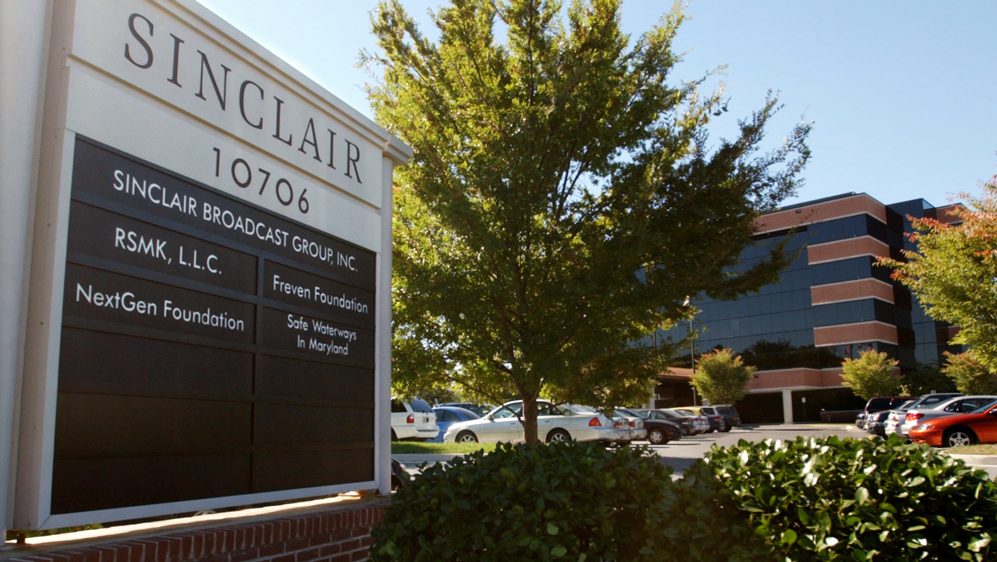Sinclair and Tribune Face Midnight Deadline on Merger Decision
By Ted Johnson
LOS ANGELES (Variety.com) – WASHINGTON — Sinclair Broadcast Group and Tribune Media face a midnight deadline on whether to continue to pursue their $3.9 billion merger deal despite the ’s refusal to approve the transaction.
The sides have the ability to walk away after today, per the terms of the initial agreement inked in May 2017. Sinclair would not comment on the status of the deal during its second quarter earnings call with Wall Street analysts on Wednesday morning.
The growing consensus in the marketplace is that Sinclair will give up on the effort to buy all of Tribune’s 42 stations and WGN America cable channel. That raises the possibility that Tribune would move to sell off its stations in piecemeal fashion, which could still leave openings for Sinclair.
“In regards to the acquisition of Company, we are working with them to analyze approaches to the regulatory process that are in the best interest of our companies, employees and shareholders,” Sinclair CEO Chris Ripley said in a statement.
The FCC last month set up a big hurdle for the deal in voting to send aspects of the transaction to a judge for an administrative hearing. That step came after FCC chairman Ajit Pai raised questions about the veracity of some of the information provided to the commission by Sinclair.
The $3.9 billion transaction would combine two of the country’s largest broadcasters into a giant with more than 200 stations. Public interest groups have lined up against the merger, and Democrats contend that Sinclair was trying to infuse local stations with a conservative bent.
The new administrative process could add a year or more to the regulatory review. The process before administrative judge Richard Sipple also will be public, and could pose a risk for the company in other ways.
Last month, Pai announced that he had “serious concerns” about the transaction. The commissioners voted unanimously to send the merger to an administrative law judge for a hearing. That hearing process has typically killed previous transactions. An adverse ruling also could raise the question of whether Sinclair’s existing broadcast licenses could be challenged.
The FCC claimed that Sinclair engaged in “a potential element of misrepresentation or lack of candor” in its effort to secure government approval. That centered on the way that Sinclair laid out its plans to divest certain stations, a necessity if it was to comply with media ownership limits.
Among other things, the FCC zeroed in on the business ties between Smith and businessman Steven Fader in connection with the plan to sell Tribune’s WGN-TV Chicago to a new entity controlled by Fader for $60 million. That plan sparked concern from merger opponents because the purchase price was so far below fair market value for a Chicago TV station. Fader is CEO of Atlantic Automotive Group, in which Smith has an equity interest and also sits on its board. The commission’s order noted that Fader had no prior broadcast TV experience, and the transaction was structured as to give Sinclair sway over the station’s operations.
Sinclair denied that it misrepresented the facts in its merger filings.
Sinclair’s ties to President Trump had been an issue throughout the regulatory process, and Trump publicly expressed his unhappiness at the FCC for failing to approve it. He called it “sad and unfair,” and added, “This would have been a great and much needed Conservative voice for and of the People. Liberal Fake News NBC and Comcast gets approved, much bigger, but not Sinclair. Disgraceful!”
One of Trump’s former communications spokespersons, Boris Epshteyn, is chief political analyst at Sinclair.
Pai, who Trump appointed as FCC chair, told a congressional hearing that he stood by the decision, and last week he said that he has not had any contact with the White House following the president’s tweet.
The merger was first inked in May 2017, and the transaction immediately became a focus of a lobbying battle in D.C. As Sinclair defended the transaction as necessary consolidation in the face of competition from cable and tech, opponents waged social media campaigns. Some other conservative news outlets, like Newsmax, The Blaze and One America News Network, publicly opposed the transaction.
One voice that did not weigh in publicly was 21st Century Fox. An initial rival to Sinclair for the Tribune stations, Fox later reached an agreement to acquire a handful of Tribune-owned Fox affiliates as part of Sinclair’s divestiture plan.
Cynthia Littleton contributed to this report.

